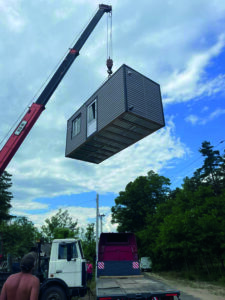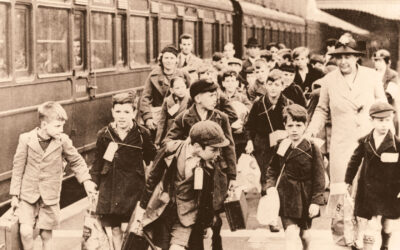More than a year ago, along with the rest of the population I was horrified by the scenes on TV of Russia invading Ukraine. I was surprised, but pleased, to receive a telephone call from Amanda Watkin, General Secretary of Rotary GB&I, asking me to lead a team of experienced Rotarians in the Rotary GB&I Ukraine Crisis Taskforce.
At our first meeting the initial challenge was to agree our purpose which was to provide a Rotary co-ordinated approach to the current Ukraine crisis, especially to displaced people both leaving and within the Ukraine and communicate to Rotarians throughout UK and Ireland.
I was very fortunate in having a very talented team of Rotarians and the delegation of responsibilities was in line with their experience, including Past District Governor Dr John Philip, Chair of the Rotary International Fellowship of Healthcare Professionals, who would lead the healthcare response.
Listen to this article
James Onions, national co-ordinator of the Rotary GB&I Inter Country Committee (ICC), and Tata Glick, leader of the Ukraine ICC would liaise with ICC members in Ukraine and bordering countries.
Mike Parry would liaise with The Rotary Foundation, Peter King would liaise with the Rotary GB&I Resilience co-leads, Roger Stent would lead with Selwyn Foreman as our liaison with all district governors, with Selwyn also Taskforce Secretary.
Jannine Birtwistle would lead our communications including our bulletin in conjunction with myself and we decided to meet weekly to distribute a weekly bulletin.
We reported to Cheryle Berry, lead of the Rotary GB&I Humanitarian Team.
Our first challenge was to gain first-hand information on how Rotary GB&I could help in healthcare and assist the huge wave of refugees fleeing Ukraine.
John Philip, through the healthcare fellowship, gained immediate information that tourniquets for wounded civilians were urgently needed, James Onions and Tata Glick contacted the ICC members in Ukraine and bordering countries to ensure we met the need on the ground and not what we thought they needed.


The Moshchun Modular home project provided shelter for Ukrainians whose homes had been destroyed.
The second challenge was to identify safe bank accounts for districts and clubs to donate funds.
Rotary International arranged secure district accounts in bordering countries since it was considered too dangerous to advise clubs to send funds direct to the Ukraine District account.
Once the Ukrainian army had stabilised the military situation, we felt it was safe to advise clubs to send funds direct to District 2232 GB pound account.
The third challenge was to effectively communicate with Rotary districts, clubs and Rotarians which we achieved through a weekly bulletin, as well as a Facebook page and a most informative Mind Map.
Action was what was needed, and Rotary throughout Great Britain and Ireland responded magnificently.
During March, enough money was donated to the healthcare fellowship to purchase 5000 tourniquets costing €30,600. Trucks of supplies were leaving on an almost daily basis resolving any border administration issues.
The Rotary Foundation launched Disaster Response Grants and we urged districts to apply for these $25,000 (£19,000) grants to support Ukraine guests who were starting to arrive in the UK. We liaised with the Rotary GB&I Resilience Team and invited contributions to our weekly bulletin.
During May we held our first joint Taskforce meeting with the Ukraine Taskforce, a huge step forward enabling us to hear on a weekly basis the needs of the Ukraine people.
In July, the Ukraine Taskforce members led by Serhiy Zavadsky highlighted the urgent need to start planning for the very cold winters.
Many Ukrainians had lost their homes and were living and sleeping in the open air. They needed shelter for the winter so the Moshchun Modular home project was launched by the Ukraine District throughout Rotary worldwide.
We urged Rotary districts and clubs to respond with the homes initially costing £10,000 or $12,500 each.
By the end of the year Rotary GB&I had raised over $350,000 enabling 28 modular homes to be built.
The continuing need for support of Ukraine has never been so important.”
By September we appealed to help Ukraine “feed the world” through removing Russian mines and ordinance by purchasing two magnetometers and software for reconnaissance of fertile land, and to make safe at a cost of €41,000.
Within days, District 1145 came forward with the money.
During November, as the Ukraine disaster deepened with the increased missile attacks, we launched appeals for generators through donations or by clubs and districts delivering directly.
This is an ongoing campaign receiving outstanding support. We appealed for warm clothing and further support for shelter.
The continuing need for support of Ukraine has never been so important.
We have recognised that occasionally donating to the Ukraine District has, in a small number of cases, been challenging.
We are therefore very grateful to three districts in Rotary GB&I for allowing us to collect funds in one of their accounts strictly controlled by their treasurer. This will mean all our projects will have a UK bank account for funds to be received.
May I on behalf of the Rotary GB&I Ukraine Crisis Taskforce thank every district, club and Rotarian for their magnificent support which we conservatively believe has totalled in excess of £6 million.
We will continue to help the desperate people of the Ukraine but can only do this with the continuing outstanding support of all Rotarians.


























































